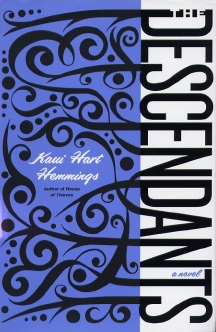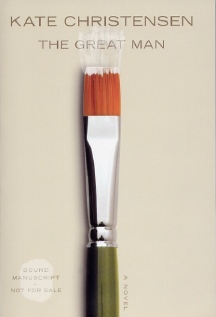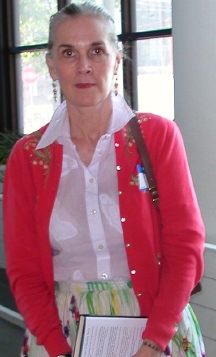|
|
|
|
This Just In...News
From The Agony Column
|
| |
|
NPR Report Sunday: Getting Your First Novel Published: Jon Clinch on 'Finn' : UPDATE with NPR URL
07-01-07:
Here's the "Email
this story" URL for my piece on Jon Clinch and Finn.
Later on today, you'll be able to listen to the story here as well. Much
hope here (and work as well) for those aspiring to write
and
sell
the first novel. Again, reader's work on emailing this story is greatly
appreciated. Thanks!
NPR is going to
run my report on getting a first novel published. I'm hoping to see
this become a series of reports with writers who
have just published their first book, and provide a lot of variety
in the process. This report focuses on Jon Clinch, author of 'Finn'.
Here's a link to my
interview with the author. I'm not sure at the
moment if the report is running on Wesun or Weekend ATC, but I'll
update this when I get more information. As ever, readers, please
email this story early and often. Your support helps me get access
to the authors you want to hear from. NPR does pay attention to most
emailed! Thanks ever so much; now back to your summer reading!
|
| |
|
06-29-07: Kaui Hart Hemmings Gathers 'The Descendents'
|
Family Fires
|
|
Family
trees. Oh, the humanity.
|
"I think paradise can go fuck itself," Matt King tells readers
early on in 'The Descendents' (Random House ; May 15, 2007; $24.95) by
Kaui Hart
Hemmings. "The tropics make it difficult to mope."
He's got his reasons to mope, enough that even living in Hawaii can't compensate.
For all you Smiths fans out there, he's got a wife, not a girlfriend, in
a coma. But as comas go, it's every bit as comedic as that experienced
by moping Morrissey's girlfriend. As comas go.
And then there are the kids. Two girls; Scottie is ten years old and
still in the pre-evil, smart-ass stage. But his seventeen-year old
girl, Alex,
is a former model and just out from rehab. This cannot be a good sign.
Or even if it is good, it's not easy to deal with. But Matt King gets
to put it in perspective. Since his wife was having an affair before
the accident that put her in that coma, Matt gets to take both kids
to meet
up with Mom's boyfriend. Sounds like a gas.
Hemmings' first novel is a treat for anyone who has a family that is less
than perfect, which suggests that she has a very large potential audience.
It seems that the King family, and there are a lot of them, are land-rich,
cash-poor Hawaiians with the opportunity to sell out, grab the cash and
leave a lovely Wal-Mart in their wake. So what do you do when your wife's
in a coma and your life's in the shit? Wisecrack, early and often.
Hemmings is a master of the middle-aged male wistful wisecrack, and if
you want to read some 283 pages of dryly-humorous yet emotionally honest
perceptions of a family under stress then 'The Descendents' is definitely
your cuppa. It's a rather remarkable performance, a pitch-perfect spiel
set amidst beauty with which the humans who live there cannot compete.
So they don’t bother. Instead, the whole damnable family comes out
of the woodwork and squabbles their way into your tiny brain, taking up
residence and offering lots of lessons in the power of negative kvetching.
The temptation is to think of 'The Descendents' as a "dysfunctional" family
drama, but in point of fact Matt and his clan are pretty damn functional.
But even paradise is on a short road to shithood, so merely functional
doesn't exactly cut it. Nor is being functional a day in the park, especially
when you have to cart your two apples who have not fallen so far from the
tree from Oahu to Kauai to confront mom's beau. This is not the sort of
thing you foresee when you sign up for fatherhood, but the point is that
nothing you expect from fatherhood materializes in the manner you expect.
So you just soldier on. Seems to help.
Hemmings' strength is her narrative voice, and 'The Descendents' is the
sort of novel that sells well to readers who are of the "pick it up
and read it in the store" variety. It's hard not to love the book
from the get-go. Sure, there's a lot of drama going on, what with the
coma, the Wal-Mart deal, whinging, money-clutching relatives and two
children
who are not exactly easy. You come to realize that even if Matt King
were to be complaining about the travails of being in the grocery store
express lane behind the person who forgot that they’re writing an
out-of-state check with no identification, he'd still be entertaining.
But Hemmings leaves the groceries to us, as she's given Matt the wife in
a coma to deal with. Of life in a coma, as it were, up until his wife moved
into that state. Sometimes, what we like to disingenuously describe as
a wake-up call involves a loved one not awakening. And if you can write
a scene with two girls and a dad standing over Mom in a coma and make readers
laugh, out loud, in the store, then that can make the readers wake up.
Or better still keep them awake after they’ve taken the book home.
|
| |
|
06-28-07: Henghis Hapthorn Enters 'The Spiral Labyrinth'
|
Scroot for Hire
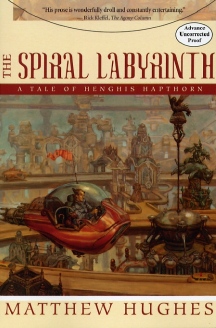 |
|
| Not
the final cover, etc, etc. And yes, that is my cover blurb. |
Just look around. Go to the bookstore and boggle your mind with the
piles of crap that present themselves. Celebrity bios. Literally tons
of books
offering advice on how to lose weight. Happy-wappy self-help books
that promise perfection for those whose fingers rarely leave the TV
remote.
Series mysteries, ranging from great to dross. Romance. More romance.
And in case you needed romance in your friggin' life, more romance.
Well-meaning exhortations of the virtues of this or that society, this
or that philosophical
slant. Slit your wrists and hope to die novels of despair from the
four corners of the earth. Aaargh!
Where can a guy get a decent friggin' book that is not part of some
media-ruled empire of shit? I'll tell you where. From Night Shade
Books, that's where.
In this case, 'The Spiral Labyrinth' (Night Shade Books duh! ; September
25, 2007 ; $24.95), the latest Henghis Hapthorn novel by Matthew
Hughes.
And you know, if you missed 'Majestrum',
which came out last year, you might want to pick that one up as well,
but you don't have to.
Or his novel for SF big-boys Tor, 'Black
Brillion'. Sure, miss
out on sparkling prose, etc. etc. There's a celebrity bio with your
name – on
the credit card slip you get when you pay for it.
All froth-mouthed ranting aside, 'The Spiral Labyrinth' is a perfect example
of how important prose skills are to what we read. Sure it seems obvious,
but it's easy and actually the idea to get caught up content of a novel.
Do they live or die? Who did it and why? Books transport us to an indescribable
realm. And if we're willing to do the work, that can be really fun, even
when the prose is just the literary equivalent of a Honda Civic. Such a
work can be really important. I've been driven through many a great novel
by Honda prose. Nothing wrong with it, and quite a bit right with it. Sometimes
anything more would be distracting.
But ah. Matthew Hughes. If the plots weren't so compelling, if the worlds
he creates weren't so sparklingly original, I could read about Henghis
Hapthorn going to the grocery store, nabbing a few veggies and coming home
to make a nice stir-fry. Pick up, please, do yourself a favor and just
pick up this novel and read the first few pages. Hughes writing is a Rolls
Royce Corniche convertible and it is a gorgeous summer's day. Why not get
behind the wheel and take a spin?
'The Spiral Labyrinth' fires off with a pretty straightforward mystery.
Effrayne Choweri's husband, Chup didn't return last night. Hapthorn needs
some money. He's for hire, he's hired and then things get more complex.
Much more complex.
I mentioned the prose, right? Incredibly witty and funny, it rolls
trippingly through your mind as you read it. But given that the prose
is so tremendously
funny and gorgeously, ornately well-written, how do the ideas, plots
and characters fare? Well, they're all mind-bogglingly able to keep
up with
Hughes' prose. Now, look, from the get-go you’re going to have be
OK with some really weird settings, characters and concepts. This is not
simply some TV detective franchise in spaceship drag. Hughes offers us
a complex vision of magic and science, of reason and wonder separated at
birth and in close competition. You’re going to encounter all
manner of sorcerers and mad scientists, monsters and men in here. Rest
assured
that conceptually it all hangs together. But be certain as well that
getting to the point is going to be more fun than you can possibly
imagine.
I've mentioned that Night Shade Books is bringing you 'The Spiral Labyrinth'.
This means a quality hardcover at regular NY publisher prices with
a great cover by Tom Kidd. Night Shade gets pretty good distribution,
so you should
be able to find this pretty much anywhere, though given that you’re
reading this review on the web, your best bet is to order it straight
up from Night Shade. They deserve your support for giving us books
like this
and moreover, it's a great deal.
Of course, there are equal arguments for going to your local independent
bookseller. Brush past the piles of celebrity bios, the glossy covers
of crapola between hardcovers. You’re probably going to have
to dig for this one. But if you like say, Philip K. Dick, or wish that
P. G. Wodehouse
were still alive and writing surreal science fiction, then you need
to hitch a ride with the gorgeous prose in 'The Spiral Labyrinth'.
Then just
look around. Somehow it will all seem better.
|
| |
|
06-27-07: Kate Christensen's Dueling Biographers
|
'The Great Man'
We all know that there are lives within lives, that each of us leads different
versions of our own lives. For our family, we may be the tired-but-loving
father and husband; for our co-workers, we may be the goofy techno-guy;
for our friends, we may be a musician, or a golfer, or a sports fan.
Somehow we manage to play all these roles and be a single person. The
lives overlap in a manner that may be joyous or simply tiring. But they
do overlap.
Usually.
Unless you've got a secret life–and that's less unusual than you
might wish to think.
It's been too long since we've heard from Kate Christensen.
I had a great conversation
with her when I read her last novel, 'The
Epicure's Lament', a hysterical novel of voice, told by one of
my favorite cranks in literature, Hugo Whittier. I loved this novel and
have been waiting not-so-patiently for what proves to be 'The Great Man'
(Doubleday / Random House ; August 14, 2007 ; $23.95), a novel about
one man, four women and two biographers. And more lives than people.
Oscar Feldman is The Great Man, a painter who helped define a generation
of painting but for one little quirk. While the Pollacks and Rothkos were
living in an abstract world, Feldman was exploring something a little more
earthy. He spent his entire artistic life painting the female nude. Now
that's a career.
The novel begins with his obit, and it is duly noted that he leaves behind
a wife, Abigail, an autistic son and a sister, Maxine, who just happens
to be a noteworthy abstract artist. Of course these were all from his first
life.
And while the rest of today's world goes ga-ga at Second Life, it's not
as if second lives are anything new. Turns out that Oscar had a second
life, in Brooklyn with his mistress Teddy St. Cloud and their twin
daughters.
One can imagine what the biographers are going to make of this. And what
the women will make of one another.
Christensen is a perfect match for this tangled web woven by a single deceiver.
Few writers can match her ability to pack a sentence with dripping, venomous,
bitter bile and remain smiling. The trick is that no matter how venal her
characters, no matter how cruel and selfish they may be, she loves every
damn one of them, every selfish bone in every aging, decaying body. Age
matters in this novel where the median is one that suggests grandmotherhood
or more. Christensen goes straight for the heart of our discomfort with
the facts of our biological lives, writing frankly about the sex lives
of characters in their 70's and 80's. The secret lives. Because it's no
longer "This is Your Life". Sorry. That was then; this is now. "These
are Your Lives". Enjoy them–or at least, reading about them.
|
| |
|
06-26-07: Jeffrey E. Barlough Visits 'Bertram of Butter Cross'
|
Sundered World, Western Lights
 |
|
| More
the cover magic we're seeking. |
"The years rush
by us like wind."
Indeed they do. And not often enough comes a year that brings a new novel
by Jeffrey E. Barlough. Of the many writers working the borders of weird
fiction, there are few as original or as hard-headed as Barlough. By that
I mean that Barlough seems to be particularly focused on a vision of fiction
that only he can see, until he writes the words down and gives us a new
book. Each work in his Western Lights series is a wonderfully out-there
unique creation, unlike anything else anyone else is writing. He truly
seems to inhabit the odd little world he's created.
He first introduced us to that world in 2000 with 'Dark Sleeper'. The
novel, set in "Salthead", takes place in an oddly conjoined combination
of Victorian England and the Western States after some sort of "sundering".
Mammoths roam the hills as well as headless ghosts. Told in a mannered
Victorian prose style, Barlough's debut managed to combine sweet and lovable
characters, low humor and deep Lovecraftian horrors. It was simply unique.
His follow-up novel, 'The
House in the High Wood: A Story of Old Talbotshire'
was to my mind even better. The characters were etched a bit more sharply,
the milieu remained unbelievably odd but utterly coherent and the horror – simply
breathtaking. It was a three year wait for 'Strange Cargo', and worth
every single second. Barlough's 2004 novel was bigger, odder and never
swayed
from the original vision that illuminates this series from within.
As a reader, you can tell that Barlough is pursuing a goal that only
he can
imagine. The opportunity to explore his prose creation is to my mind,
unmissable.
But unique visions aren't easy for the mass-marketing divisions of
major publishers to sell. One has to give Ace / Penguin Putnam credit
for picking
up Barlough in the first place, but the cover art for his first two
books was tragic. Readers really couldn’t tell what they were
getting into, and I will allow that Ace had a hard job on their hands.
How to sell Barlough's
Sundered World? He himself had avoided articulating the thoughts behind
his creation in the works themselves. This was part of their delight.
They did not seem to be about a world, they seemed to come from a world.
They
weren't fantasy, though they were fantastic. They weren't horror, though
they were horrific. They weren't science fiction either. There wasn't
a lot of technology hanging round. They were simply great and very
unusual
reading.
I feared we had seen the last of Barlough, but after three years he'd
given us another gift from the sundered world, 'Bertram of Butter Cross'
(Gresham & Doyle
; August 1, 2007 ; $14.95). And what a joy it is to have Barlough back
among us. Perhaps the fantasy genre has evolved enough to accommodate
Barlough, because on the back of the book, they're calling it fantasy.
With a cover
from a painting by Elizabeth Adela Stanforth Forbes, I'm really hoping
that guys get the kind of distribution that helps this book land amidst
the piles of trade paperbacks from Susanna Clarke and Gordon Dahlquist.
One of the strengths of the Western Lights series is that the book
stand well on their own, so that a reader who managed to lay hands
on 'Bertram
of Butter Cross' might well be enchanted enough to seek the other books
in the series and not suffer any problems in terms of the order they
were read in.
'Bertram of Butter Cross' unfolds in the environs of Marley Wood, where
something odd has taken up residence. Jemma Hathaway, her brother Richard
and a gallery of delightfully named and framed characters shall have to
sort it out, and probably enjoy a few delightful repasts in the process.
Readers can only hope for more, and apparently more is on tap. For in spite
of my earlier assurances that you can read these books in any order, Barlough
promises that next year we'll have his first true sequel, a novel set in
Salthead, last seen in 'Dark Sleeper'.
Readers who have not yet had the delight of discovering Barlough's
work should definitely take a look at the Western
Lights website. It's
nicely
designed, easy-to-read and will give you a handsome précis for
the Sundered World and Barlough's odd vision. Better yet, buy the books.
They
are a truly unique reading experience. The years do rush by like wind.
But 'tis better to have at least realized this is so. Better to have
the memories of the books we read to hand.
|
| |
|
06-25-07: A 2007 Interview with Susanna Moore
|
"There's
something about it that bothers you"
It is inevitably true that humans love nothing more than to see other
humans make mistakes. Oh how we desire those cherished moments when we
can enjoy someone else's screw-ups, those stolen jolts of joy we experience
when someone other than ourselves makes a dog's breakfast of it all.
Most of us are smart enough not to publicize such moments, but apparently,
I'm not most of us. I know that many readers, "bloggers" and
listeners live for those audio gaffes that inevitably occur when I, not
to put too fine a point upon it, screw it up, or an author shows me up.
Listen up then, because my interview with Susanna Moore is
a gold mine of screw-ups on my part. None of that smooth interviewer
stuff going
on here. No, some 48 minutes in you'll hear me attempt to end the interview.
Unsuccessfully. To be fair, my engineer had recently told me that I needed
to end my interviews on time, as I tend to run long, stray into the next
time block and they end up with people waiting in the green room. Susanna
More had just uttered a nice "stopping point" phrase, and I
thought, well, here goes.
Not quite the case. In fact, the whole interview with Susanna Moore was
off my usual track. To my mind, it was for the better. Moore and I engaged
on a rather closer, more personal level than usual. She wanted to interview
me, something I tend to resist. I figure that over the long haul, my
listeners get more than enough of me, and so I try to stay out of my
own way. But Moore was pretty insistent upon it, and in the end, I just
thought, "What the hell!"
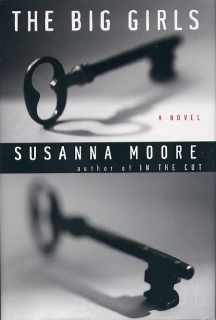 |
|
| Her
new novel unlocks some secrets. |
Let's ratchet back a bit OK? Part of the reason things went rather oddly
was that Moore's driver thought she knew who I was. So driving Moore
over, she told the author that I may or may not have bothered to read
the book beforehand. Moore arrived ready to talk to someone who hadn't
a clue as to who she was or what the book was about. So when she arrived
to find a guy with an entire stack of yellow stickies marking note points
in her slim but powerful novel 'The
Big Girls', I think that she was
taken aback. Plus, I was early in the interview process. As usual, I
started the interview with a request for readings. I wanted two readings,
one from the point-of-view of Dr. Forrest, and the other from the point-of-view
of Helen, the abuse survivor and murderess. Generally, I try to pre-select,
but not too rigidly, since authors often have some passage they'd prefer
to read. In this case, I picked out something from Helens POV kind of
on the fly. I'd read it myself, but as Moore read it aloud, I realized
just how horrific it was. By the time she finished, I was squirming.
Where do we go from here? I wondered.
Moore and I talked for well over an hour, and even then I managed to
turn off the recording a bit too early. Be that as it may, readers can
hear what I did record. At 48'34" you can hear my gaffe, so to speak,
on the MP3 or RealAudio file.
After that things get really interesting as Moore grills me on why I
find a book about child abuse and child murder
so disturbing. 'The Big Girls' is a fascinating novel, but I've not read
anything quite so heinous in terms of the human horror it portrays. To
me it's patently obvious why this book is so disturbing. It's about the
worst that humanity has on offer. But it is gloriously well-written in
super-scrubbed-clean prose. It's an excellent novel. And despite my discomfited
state, I think the interview is at least pretty entertaining. I hope
my listeners are ready to enjoy another Kleffel screw-up. It won’t
be the last, I hope.
|
| |
|
|




